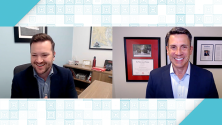Is the CIO role diminishing? Is it being sidelined? Is it going away completely to make room for the chief digital officers of the future? If you believe the headlines and hype, you might think so. But Adam Dennison, senior vice president and publisher of IDG Enterprise doesn't buy it – and neither do the CIOs he talks to every day. We spoke with Adam to find out what makes him confident in the staying power of the CIO, and how he sees the role evolving in the coming years.
The Enterprisers Project (TEP): Earlier this year, CIO Magazine completed its 2015 State of the CIO survey. Based on the results, how would you say CIOs are feeling about their job security these days as they face tremendous change in the digital era?

Dennison: In our survey, we asked CIOs what they think they’ll be doing in the next three to five years, and 50 percent said they’d still be CIOs. The next highest response was COO, followed by chief digital officers, but it was a big drop-off in percentage for both.
The CIO role isn't going anywhere, but I do believe it will evolve – as will every C-level position in response to digital transformation. The CMO role is evolving; they have to understand the marketing stack and leverage data and technology more than they've ever done in the past. Sales is evolving as technology changes the ways they are able to get out in front of their customers and communicate value.
TEP: How do you see this evolution changing the responsibilities and role of today's CIO?
Dennison: The CIO role is evolving in the sense that they are moving out of supporting roles and into a business leadership position within the company. Rather than worry about being disrupted out of their job, they are looking outward at the potential disruptors of the business. If I'm the CIO of Starwood, for example, I'm keeping a close eye on Airbnb.
Another way we see the CIO role evolving is exemplified by the emergence of the CIO-plus. It's not uncommon today to see someone with the dual title of CIO and CFO, or a CIO title that reflects a strategic focus on real estate or facilities or business operations. That’s disruptive in a good way, because CIOs are earning the right to take on other business responsibilities.
That's not to say that CIOs can get too comfortable in their job security. We recently asked both CIOs and their business unit counterparts the same question: “Do you believe that IT is an inhibitor to other business units’ missions?” Only 33 percent of CIOs responded yes, while 54 percent of the line of business executives said yes. That 21 percent gap between the two groups is concerning, and I think that’s what could cause a CIO to lose their job. CIOs who are not working with the business to help them understand the value of IT are the ones at risk of being disrupted out of their roles.
TEP: It certainly sounds like an exciting and critical time to be a CIO. What else is changing for IT leaders?
Dennison: I’ve been in this space since 2000, when we just started talking about alignment. Now it’s really time to lead. Technology has moved to the center of business. CIOs reporting to the CEO is at an all-time high, and average tenures are increasing as a result.
Another trend making things more exciting for CIOs is the whole concept of failing fast. One CIO recently said something that stuck with me: “Inch by inch things are a cinch, yard by yard things are hard.” And what he meant by that was, “We have this huge project we have to undertake, so let’s break it down into small pieces, and we can get it done smarter.” Agility and bimodal IT are enabling CIOs to keep the lights on while also tackling cool things on the side. They might fail, but they fail quickly, learn from it and move on. We are now in an era in which organizations are more open to failure than ever before, because they are seeing it as necessary to keep up with the pace of technology change.
Adam Dennison brings more than 15 years of media sales experience to his role as Senior Vice President & Publisher for IDG Enterprise, leading the integrated sales team. In this role, Dennison oversees the brands go-to-market strategies, including brand positioning, market research and creating turnkey solutions for his clients. Dennison joined IDG in 2007 as National Sales Director for the Custom Solutions Group where he excelled in providing innovative marketing services. A popular moderator, speaker and columnist, Dennison possesses an in-depth knowledge of emerging technologies and key strategies for marketing to IT decision-makers. These insights are shared in his regular CIO magazine column. Additionally, Dennison has recently spoken at several conferences and private events for companies including Avaya, Citrix, Dropbox, Samsung and VMware.







